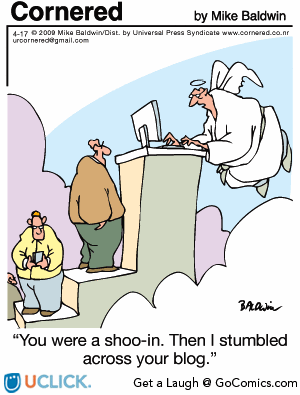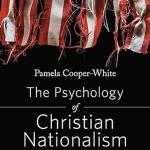 One of the recent conservative commenters on my blog decided to write to my pastor to make sure that he is aware of the sorts of views I have. He is (he regularly attends my Sunday school class, as well as being someone I’ve talked to often in other less formal settings). This occurrence got me thinking about the more conservative Christian contexts in which such an intervention might lead to questions, accusations, suspicions, discipline, expulsion, conflict, and who knows what else.
One of the recent conservative commenters on my blog decided to write to my pastor to make sure that he is aware of the sorts of views I have. He is (he regularly attends my Sunday school class, as well as being someone I’ve talked to often in other less formal settings). This occurrence got me thinking about the more conservative Christian contexts in which such an intervention might lead to questions, accusations, suspicions, discipline, expulsion, conflict, and who knows what else.
I’ve been thinking that a good slogan for my Sunday school class might be “Come work out your salvation without fear and trembling.” This isn’t yet another example of me being “unbiblical“. I do think that there is a genuine and appropriate fear and trembling involved in exploring life’s most important questions. But that is fear before God and personal acknowledgement of the seriousness of the matter. But too often, one’s fear and trembling when “working out their salvation” is fear of recrimination, fear of ostracization, fear of other people and their opinion.
Such concerns often lead doubts to be denied publicly, perhaps even denied to ourselves. In such circumstances, being a Christian often becomes a matter of appearance, of pretending to be more certain than one really is, or simply refusing to ask certain kinds of questions. I often think that, if I had had to work out my salvation while pretending in this way lest I find myself in conflict with those around me, it might well have led to hypocrisy and, in the end, to a loss of faith. For I am persuaded that intellectual and spiritual dishonesty is much more toxic to faith than honest questioning, historical criticism, academic investigation, or anything else that fundamentalists find threatening and at odds with a genuine Christian faith.
We discussed this subject today in my Sunday school class, and I think it was helpful to others present both to be able to acknowledge that they do not have all the answers, and to learn that psychologists like James Fowler have suggested that our being in different places in our spiritual walks or “faith development” is not only inevitable but natural and healthy.
A conservative blog recently described me as “dangerous”, and I realized that I should take that as a compliment. Acknowledging the possibility of being a Christian while at the same time engaging in open discussion of ideas, tolerating uncertainty, and anticipating that you might have something to learn from those with whom you disagree, is dangerous to fundamentalism – but not to Christian faith per se. What is dangerous to Christian faith is viewing it as though it were something static, as though the understanding of it one has as a child should remain static throughout life, or that Christianity itself could or should remain static throughout history. But perhaps more dangerous still is the conviction that our own understanding is God’s very truth -that cannot but lead to a spiritual pride and arrogance that is incompatible with the Christian faith in general, and with the fallibility of the greatest heroes of the faith as depicted in the Bible in particular.
















